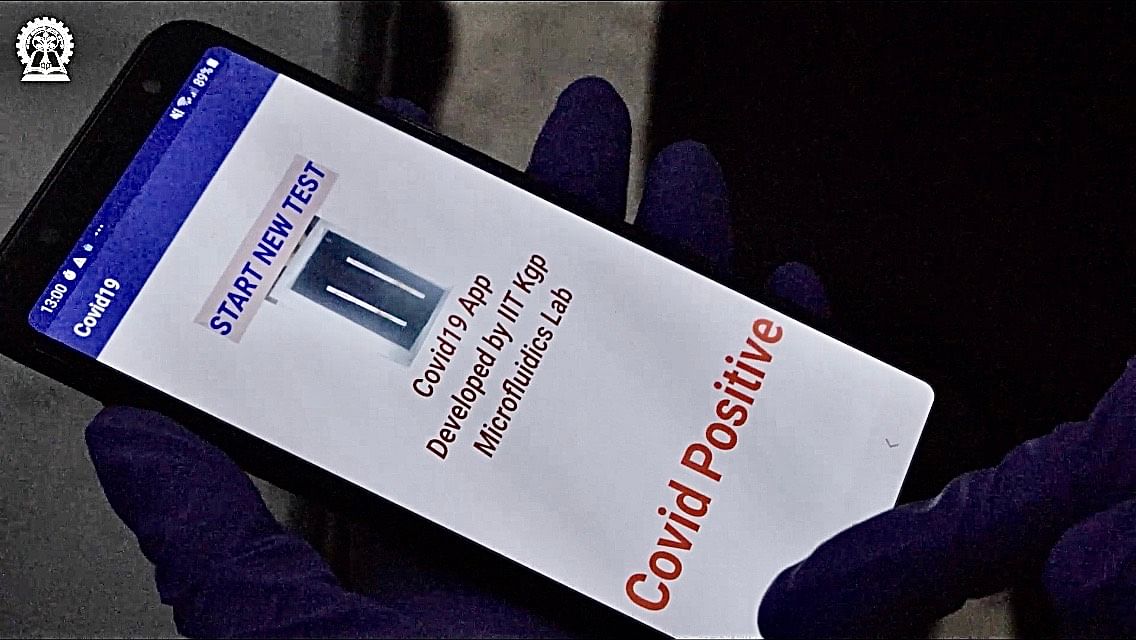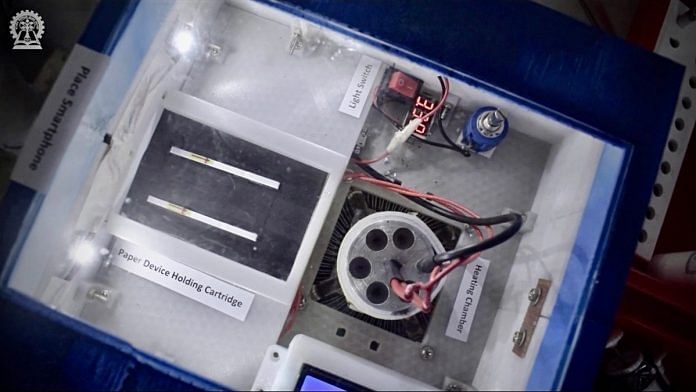New Delhi: The Indian Institute of Technology, Kharagpur, claims to have created a simple, portable device that can conduct rapid diagnostic tests on Covid-19 samples.
Priced at Rs 2,000, the device relies on temperature-controlled check and can turn out results in an hour. Each test is expected to cost Rs 400, about five to six times cheaper than the current gold standard RT-PCR test.
In a video conference Saturday, Prof. Suman Chakraborty, Department of Mechanical Engineering, and a member of the team that developed the device, said, “The device functions on a pre-programmed test fed into the device. It has a microfluidic paper-based detection system; the colour of the paper will determine if a sample is positive or negative.”
Explaining the reason behind the low cost of the electronic device, Chakraborty said, “The PCR machines used inside labs have complex optical systems and thermal cycling processes which make the machine expensive. This process has been completely replaced by a temperature-controlled check in our device.”
He added that the pricing is subject to change since they expect it to reduce once mass production and mass testing begins.
The device has been registered for a patent.
Also read: IIT-Delhi’s RT-PCR kit, with base price of Rs 399, opens new avenue for cheaper Covid tests
How the device works
The cuboid-shaped device takes an hour to test a sample and can conduct pool testing. This means 3-10 samples can be tested simultaneously in one machine and the result will be declared on the microfluidic paper.
Professor Chakraborty explained that the DNA of the virus is mixed with chemicals on a strip of paper. When the chemicals come in contact with the DNA, the reaction determines whether a sample is positive or negative.
The disposable paper-strip records the results of the test, which can be read using a mobile phone app that the team developed.

The team included biologists, engineers and software developers.
Prof. Arindam Mondal, assistant professor, School of BioSciences, IIT-Kharagpur, said, “So far, in tests conducted at the institute, results of 500 test samples conducted with our device were cross verified with an RT-PCR machine and all results matched.”
Since the institute was not working with live novel coronavirus samples, the team created synthetic RNA of the virus to test the device.
In terms of how viable the test would be long term, in case the virus mutated in the future, Mondal said, “Some of the genome sequences, which are proteins of the virus, remain conserved and are highly unlikely to change. The probe in the machine is designed and programmed in a way that it can identify these sequences.”
He added that advanced probes could be added to the device in the future when the need arises.
Human trials using the device are yet to be conducted and the institute has reached out to the Indian Council of Medical Research for approvals.
The university claims that the device is market-ready, and Prof. Virendra Kumar Tewari, director, IIT Kharagpur, said they were waiting for offers from private contractors and the government to begin mass production of the device.
The team said the device will help make testing for Covid-19 more accessible to the under-served communities with limited access to a lab set-up. All the device will require is a swab sample and can be run in any sanitised environment by health workers. However, since it runs electricity, low wattage could lead to an increase in test time, but will not affect the accuracy, said Prof. Chakraborty.
Also read: Capacity is not what’s hindering India’s testing rate, government price caps are



